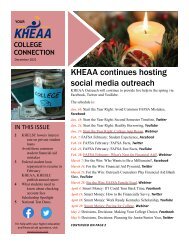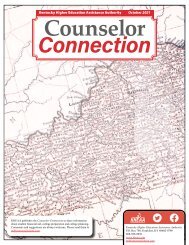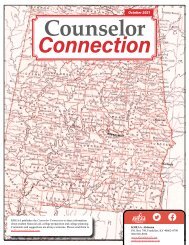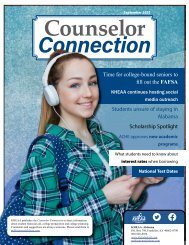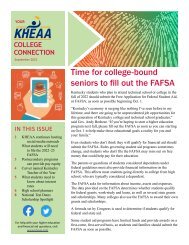Fourth Draft
You also want an ePaper? Increase the reach of your titles
YUMPU automatically turns print PDFs into web optimized ePapers that Google loves.
RURAL DOMESTIC<br />
PREPAREDNESS CONSORTIUM
The Rural Domestic Preparedness Consortium (RDPC),<br />
through its Consortium Members, will provide small, rural,<br />
and tribal responders and communities with the knowledge,<br />
skills, and abilities to enhance the safety, and quality of life<br />
for their citizens through training, technical assistance, and<br />
information sharing.<br />
Rural communities across America will have the knowledge,<br />
skills, and abilities necessary to enhance the safety, security,<br />
and quality of life for citizens.<br />
RURAL DOMESTIC<br />
PREPAREDNESS CONSORTIUM<br />
1 | Rural Domestic Preparedness Consortium
Executive Message<br />
Meet the Consortium Members<br />
Meet the RDPC Staff Members<br />
The Center for Rural Development<br />
What is Rural?<br />
Training Disciplines Reached<br />
2020 Training Numbers<br />
3<br />
4<br />
5-6<br />
7-8<br />
9<br />
10<br />
11-12<br />
Training Innovation Overcomes Obstacles<br />
National Training Map<br />
Training Kentucky and the Nation (magazine article)<br />
Academic Members and Affiliates<br />
Tribal Nations Preparedness Training<br />
A Message from the Director<br />
13-15<br />
16<br />
17-20<br />
21-32<br />
33<br />
34<br />
The Rural Domestic Preparedness Consortium (RDPC), led by The Center for Rural Development, is<br />
comprised of academic members with the expertise in developing and delivering homeland security<br />
curriculum for rural and tribal first responders. For more information, visit us at www.ruraltraining.org<br />
This project was supported by Cooperative Agreement Numbers EMW-2016-CA-00097-S01, EMW-2017-CA-00052-S01,<br />
EMW-2018-CA-00075-S01, and EMW-2019-CA-00048-S01 and administered by the U.S. Department of Homeland Security. Points of view or<br />
opinions expressed in this document are those of the author and do not represent the official position or policies of U.S. Department of Homeland<br />
Security.<br />
FEMA’s National Training and Education Division (NTED) offers a full catalog of courses at no-cost to help build critical skills that responders need<br />
to function effectively in mass consequence events. Course subjects range from Weapons of Mass Destruction (WMD) terrorism, cybersecurity,<br />
and agro-terrorism to citizen preparedness and public works. NTED courses include multiple delivery methods: instructor-led (direct deliveries),<br />
virtual deliveries (instructor-led), train-the-trainers (indirect deliveries), customized (conferences and seminars) and web-based. Instructor-led<br />
courses are offered in residence (i.e. at a training facility) or through mobile programs, in which courses are brought to state and local jurisdictions<br />
that request the training. A full list of NTED courses can be found at www.firstrespondertraining.gov.<br />
2020 Annual Report | 2
Executive Message<br />
The COVID-19 global pandemic of 2020 has yielded unprecedented<br />
challenges within the emergency responder training community. As the<br />
virus spread rapidly, delivering an in-person preparedness curriculum was<br />
no longer an option to ensure our nation’s emergency responders stayed<br />
safe and healthy. In the face of adversity, the RDPC overcame these<br />
obstacles by delivering practical, innovative training solutions to<br />
emergency responders in small, rural, and tribal jurisdictions.<br />
Led by The Center for Rural Development in Somerset, KY, the RDPC has<br />
trained more than 110,000 emergency responders from small, rural, and<br />
tribal communities in all 50 states and 5 U.S. territories from January 2005<br />
through December 2020.<br />
No matter the circumstances, the RDPC remains dedicated to the mission<br />
of delivering all-hazards training by helping our nation’s first responders...<br />
Lonnie Lawson<br />
RDPC Principal Investigator<br />
President & CEO<br />
The Center for Rural Development<br />
3 | Rural Domestic Preparedness Consortium<br />
RURAL DOMESTIC<br />
PREPAREDNESS CONSORTIUM<br />
The RDPC works in close partnership with<br />
the National Domestic Preparedness<br />
Consortium (NDPC) to secure and prepare<br />
a safe and resilient nation. The Consortium<br />
consists of seven-member organizations,<br />
each having distinguished themselves<br />
nationally as experts in their field.
The Consortium Members<br />
Led by The Center for Rural Development, the RDPC is comprised of 5<br />
academic members and 1 affiliate with expertise and niche capabilities in<br />
developing and delivering training to small, rural, and tribal communities.<br />
Each institution brings a vast amount of knowledge and experience that<br />
prepares communities in the event of a disaster. We value each member,<br />
as well as their steadfast dedication to help others “prepare for the worst<br />
and train to be the best.”<br />
For more information about the RDPC and it’s academic members, visit us<br />
online at www.ruraltraining.org or call 877-855-RDPC (7372).<br />
2020 Annual Report | 4
The RDPC Staff<br />
Lonnie Lawson<br />
Principal Investigator<br />
llawson@centertech.com<br />
Jennifer Grigsby<br />
Director of Program Development,<br />
Evaluation, and Design<br />
jgrigsby@centertech.com<br />
Julie Wilson<br />
Director<br />
jwilson@centertech.com<br />
Kim Ellis<br />
Program Administrator<br />
kellis@centertech.com<br />
Danny Ball<br />
Associate Director<br />
dball@centertech.com<br />
Michael Crowhurst<br />
Delivery Coordinator<br />
mcrowhurst@centertech.com<br />
5 | Rural Domestic Preparedness Consortium
Vicki Hiestand<br />
Associate Director of Finance<br />
vhiestand@centertech.com<br />
Laura Glover<br />
Managing Director of<br />
Marketing & Events<br />
lglover@centertech.com<br />
RURAL DOMESTIC<br />
PREPAREDNESS CONSORTIUM<br />
Crystal Tygart<br />
Staff Accountant<br />
ctygart@centertech.com<br />
Ray Hagen<br />
Marketing Associate RDPC<br />
rhagen@centertech.com<br />
Much like the rural first responder community, our staff,<br />
support team, and consortium members work together to<br />
achieve the overall mission and vision of the RDPC. The<br />
team is honored to serve our nation’s first responders by<br />
delivering relevant, all hazards training to small, rural and<br />
tribal communities across America.<br />
RURAL DOMESTIC<br />
PREPAREDNESS CONSORTIUM<br />
2020 Annual Report | 6
The Center for Rural Development<br />
RDPC is led by The Center for Rural Development in Somerset, KY. Established in 1996 through the<br />
vision of U.S. Congressman Harold Rogers (KY-05), The Center for Rural Development is a 501c(3)<br />
nonprofit organization fueled by a mission to provide leadership that stimulates innovative and<br />
sustainable economic development solutions and a better way of life for the citizens we serve. The<br />
Center is also a nationally recognized model for successful rural development.<br />
The Center has four Focus Areas: PUBLIC SAFETY, ARTS & CULTURE, LEADERSHIP, and<br />
TECHNOLOGY, serving a 45-county primary service area in Southern and Eastern Kentucky. We are<br />
committed to constantly expanding our capabilities in order to deliver a range of key services throughout<br />
Kentucky and beyond. The Center’s Public Safety programs are reaching first responders and law<br />
enforcement professionals across the nation.<br />
The Center has expertise in developing and administering training programs, including curriculum<br />
design, development, and delivery, utilizing the in-house web and video conference systems required to<br />
reach the rural homeland security community. As Executive Agent, The Center also plays a key role as a<br />
technology provider to the RDPC program. The Center is responsible for the design, development, and<br />
continued support of the RDPC web presence as well as online training registration, evaluation reporting<br />
capabilities, and learning management systems. The Center is a DHS/FEMA training provider.<br />
7 | Rural Domestic Preparedness Consortium
The Center for Rural Development 2292 S. Hwy. 27. Somerset, KY 42501 centertech.com (606) 677-6000<br />
2020 Annual Report | 8
What is Rural?<br />
Since its inception, RDPC has worked diligently to develop and deliver training to small and rural communities throughout<br />
the United States. While Americans tend to have an idealized image of rural America, a common definition for “rural” is<br />
difficult to find and is one of the most popular questions asked of RDPC.<br />
Consistent with guidance from the U.S. Census Bureau, RDPC defines the rural communities it serves as “any location<br />
with a population of less than 50,000 and with a population density of less than 1,000 persons per square mile.”<br />
In addition to the U.S. Census Bureau, most Federal agencies use a population threshold of under 50,000 to define a<br />
“rural” area.<br />
RDPC interprets the phrase, “any location,” as applying to cities, towns, villages, parishes, communities, and counties, a<br />
flexibility that ensures areas are not excluded unduly. For example, this definition can include a rural city within an urban<br />
county. The citizens of rural communities face unique challenges when preparing for all-hazards. For example, limited<br />
population and tax bases can create difficulties for community public safety agencies in terms of staffing, equipment, and<br />
other resources.<br />
In many cases, RDPC represents the only opportunity for emergency response service providers to obtain access to<br />
timely, effective training. Therefore, understanding rural America and working to identify its specific needs are critical<br />
tasks for RDPC.<br />
By speaking with rural responders and researching rural needs and capability gaps, RDPC recognizes that many rural<br />
response agencies are staffed by volunteers, and backfill for training remains an issue. Yet, rural responders represent<br />
the surge capacity and increased capabilities the U.S. relies on to assist in large scale disasters.<br />
A rural area is often the first line of defense to immediately contain an event or disaster before it escalates. It is imperative<br />
that rural responders receive the training and tools necessary to help keep the Nation safe and prepared.<br />
9 | Rural Domestic Preparedness Consortium
Training Disciplines Reached in 2020<br />
Level of Discipline<br />
Students Trained<br />
Agricultural Safety<br />
19<br />
Animal Emergency Services<br />
21<br />
Citizen / Community Volunteer<br />
49<br />
Emergency Management<br />
471<br />
Emergency Medical Services<br />
48<br />
Fire Service<br />
209<br />
Governmental Administrative<br />
38<br />
Hazardous Materials<br />
2<br />
Healthcare<br />
66<br />
Information Technology<br />
5<br />
Law Enforcement<br />
363<br />
Private Sector<br />
0<br />
Public Health<br />
146<br />
Public Safety Communications<br />
22<br />
Public Works<br />
13<br />
Security and Safety<br />
18<br />
Search and Rescue<br />
13<br />
Transportation Security<br />
9<br />
Other<br />
532<br />
Total Number of Students Trained 2,044<br />
(Data reflects training disciplines reached for ILT and virtual course deliveries. Data does not reflect web-based training.)<br />
2020 Annual Report | 10
Instructor-Led Courses<br />
AWR 144 Port and Vessel Security for Public Safety and Maritime Personnel<br />
AWR 147 Rail Car Incident Response<br />
AWR 148 Crisis Management for School-Based Incidents: Partnering Rural Law Enforcement,<br />
First Responders, and Local School Systems<br />
AWR 209 Working with the Media: A Course for Rural First Responders<br />
AWR 232 Mass Fatalities Planning and Response for Rural Communities<br />
AWR 302 Pipeline Security for Rural Communities<br />
AWR 328 All Hazards Preparedness for Animals in Disasters<br />
MGT 335 Event Security Planning for Public Safety Officials<br />
MGT 381 Business Continuity Planning<br />
MGT 383 Emergency Operations Plans for Rural Jurisdictions<br />
MGT 401 Planning and Intervention for Security Threat Groups, Hate, and Terrorist Groups<br />
in Rural Jails and Prisons<br />
MGT 403 Access and Functional Needs Preparedness Planning for Rural Communities<br />
MGT 405 Mobilizing Faith-Based Community Organizations in Preparing for Disasters<br />
MGT 406 Community Threat Group Identification, Assessment & Information Reporting<br />
for Rural Law Enforcement Officers<br />
MGT 415 Disaster Recovery in Rural Communities<br />
MGT 416 Continuity of Government Operations Planning for Rural Communities<br />
MGT 417 Crisis Management for School-Based Incidents for Key Decision Makers<br />
MGT 433 Isolation and Quarantine for Rural Communities<br />
MGT 448 All Hazards Planning for Animal, Agricultural, and Food Related Disasters<br />
MGT 449 Community-Based Response to All Hazards Threats in Tribal Communities<br />
PER 294 Testing an Emergency Operations Plan in a Rural EOC<br />
PER 333 Isolation and Quarantine Response Strategies in the Event of a Biological<br />
Outbreak in Tribal Communities<br />
Completions<br />
0<br />
133<br />
276<br />
121<br />
64<br />
0<br />
94<br />
78<br />
15<br />
14<br />
32<br />
137<br />
70<br />
0<br />
41<br />
19<br />
30<br />
81<br />
56<br />
19<br />
44<br />
0<br />
Total Instructor-Led Course Completions in 2020<br />
1,324<br />
11 | Rural Domestic Preparedness Consortium
Virtual Courses<br />
AWR 144-V Port and Vessel Security for Public Safety and Maritime Personnel<br />
AWR 147-V Rail Car Incident Response<br />
AWR 148-V Crisis Management for School-Based Incidents: Partnering Rural Law<br />
Enforcement, First Responders, and Local School Systems<br />
AWR 209-V Working with the Media: A Course for Rural First Responders<br />
AWR 232-V Mass Fatalities Planning & Response for Rural Communities<br />
MGT 381-V Business Continuity Planning<br />
MGT 383-V Emergency Operations Plans for Rural Jurisdictions<br />
MGT 401-V Planning and Intervention for Security Threat Groups, Hate, and Terrorist<br />
Groups in Rural Jails and Prisons<br />
MGT 403-V Access and Functional Needs Preparedness Planning for Rural Communities<br />
MGT 405-V Mobilizing Faith-Based Community Organizations in Preparing for Disasters<br />
MGT 406-V Community Threat Group Identification, Assessment & Information Reporting<br />
for Rural Law Enforcement Officers<br />
MGT 415-V Disaster Recovery in Rural Communities<br />
MGT 416-V Continuity of Government Operations Planning for Rural Communities<br />
MGT 433-V Isolation & Quarantine for Rural Communities<br />
Total Virtual Course Completions in 2020<br />
Web-Based Courses<br />
AWR 148-W Crisis Management for School-Based Incidents: Partnering Rural Law<br />
Enforcement, First Responders, and Local School Systems<br />
AWR 187-W Terrorism and WMD Awareness in the Workplace<br />
AWR 209-W Working with the Media: A Course for Rural First Responders<br />
MGT 335-W Event Security Planning for Public Safety Officials<br />
MGT 433-W Isolation and Quarantine for Rural Communities<br />
Total Web-Based Course Completions in 2020<br />
Completions<br />
203<br />
0<br />
148<br />
39<br />
138<br />
72<br />
25<br />
0<br />
0<br />
64<br />
0<br />
0<br />
0<br />
20<br />
11<br />
720<br />
135<br />
1255<br />
165<br />
196<br />
402<br />
2,153<br />
2020 Annual Report | 12<br />
Total number of students trained in 2020: 4,197
Training Innovation Overcomes Obstacles<br />
RDPC delivers virtual training solutions amidst the Coronavirus crisis.<br />
The global pandemic of 2020 has posed numerous challenges to the emergency responder training community. As the<br />
Coronavirus crisis progresses, the need for all- hazards preparedness continues. Instructor-led training opportunities have<br />
diminished due to the inherent challenges associated with social distancing. To overcome these obstacles, the Rural<br />
Domestic Preparedness Consortium (RDPC) has developed and implemented innovative, virtual, instructor-led training<br />
solutions for small, rural, and tribal jurisdictions utilizing the Zoom for Government training platform.<br />
Training here, there, and anywhere.<br />
This leading-edge technology offers a secure, sophisticated, encrypted environment so that emergency responders can<br />
"learn virtually anywhere." Each virtual delivery is an 8-hour course presented over two consecutive days. Each day<br />
consists of one 4-hour training session in which participants engage with a live instructor.<br />
These virtual deliveries cover a variety of relevant all-hazards training topics to include the following:<br />
AWR 144-V Port and Vessel Security for Public Safety and Maritime Personnel<br />
AWR 147-V Rail Car Incident Response<br />
AWR 148-V Crisis Management for School-Based Incidents: Partnering Rural Law Enforcement,<br />
First Responders, and Local School Systems<br />
AWR 209-V Working with the Media: A Course for Rural First Responders<br />
AWR 232-V Mass Fatalities Planning & Response for Rural Communities<br />
MGT 381-V Business Continuity Planning<br />
MGT 383-V Emergency Operations Plans for Rural Jurisdictions<br />
MGT 401-V Planning and Intervention for Security Threat Groups, Hate, and Terrorist Groups in Rural Jails and Prisons<br />
MGT 403-V Access and Functional Needs Preparedness Planning for Rural Communities<br />
MGT 405-V Mobilizing Faith-Based Community Organizations in Preparing for Disasters<br />
MGT 406-V Community Threat Group Identification, Assessment & Information Reporting for Rural Enforcement Officers<br />
MGT 415-V Disaster Recovery in Rural Communities<br />
13 | Rural Domestic Preparedness Consortium
MGT 416-V Continuity of Government Operations Planning for Rural Communities<br />
MGT 433-V Isolation & Quarantine for Rural Communities<br />
After months of planning and preparation, the RDPC—along with academic member University of Findlay's All Hazards<br />
Training Center—conducted the first two Zoom deliveries during the last week of July. They delivered AWR 148-V Crisis<br />
Management for School-Based Incidents-Partnering Rural Law Enforcement, First Responders, and Local School<br />
Systems course. A total of 51 students participated in and completed the deliveries that were held in the West Plains,<br />
Missouri and Bedford, Kentucky jurisdictions.<br />
Student engagement is key.<br />
Students in attendance represented diverse professional backgrounds including that of law enforcement, school system<br />
administrators, fire service professionals, and emergency medical service professionals. In the virtual training<br />
environment, students engaged with instructor Scott Lowry by asking and answering questions, participating in polls, and<br />
collaborating in group chat sessions. Scott's expertise as a law enforcement professional, accompanied by a passion to<br />
educate others, provided participants with invaluable insight into school-based incident preparedness.<br />
Interaction between the instructor and participants promoted valuable discussion regarding course content and past<br />
experiences. There were many comments on the evaluation form reflecting the benefit of virtual classroom interaction. For<br />
example, in response to the evaluation question regarding the part of the course that was most valuable, one participant<br />
commented: “Local interaction with other students, even virtually through chat.” Another participant added: “Module 3<br />
gave a lot of information and tools (about) threat assessments that I didn’t know about.”<br />
During the global pandemic, participant safety is paramount in delivering all-hazards training to emergency responders.<br />
"The benefits of virtual deliveries include no travel required and allowing folks to interact safely, with no concerns of<br />
COVID exposure," said Laura Hoehne, Project Manager for the All-Hazards Training Center at The University of Findlay.<br />
"Although we look forward to the time when we can resume face-to-face deliveries, we are excited (to offer) valuable<br />
RPDC training using the Zoom platform."<br />
Continuation of all-hazards training is paramount when ensuring our nation's emergency responders are adequately<br />
prepared. "We are dedicated to continuing training under the most difficult of circumstances," said Julie Wilson, Director of<br />
2020 Annual Report | 14
the RDPC. When faced with the challenges of the global pandemic, the RDPC responded by providing innovative training<br />
solutions for our nation's emergency responder community.<br />
Feedback can be fun<br />
Countless hours of behind-the-scenes development and testing took place to ensure these virtual training deliveries would<br />
be successful. Everything had to be evaluated and examined, including course content, the registration process, and<br />
communication between the consortium and the participants. The process presented many new challenges but proved<br />
worthwhile and rewarding. There were lessons learned, as well as welcomed surprises during the virtual deliveries that<br />
will help guide future processes.<br />
Following the virtual deliveries, the RDPC received positive, encouraging participant feedback. One participant said "This<br />
is a GREAT ZOOM class. More classes need to be held like this. Just because the pandemic is around, doesn't mean<br />
people don't have time to train. We are sitting around, and wringing our hands thinking, we are behind on training. This is<br />
the PERFECT time to be doing more and more of this. Especially since folks can't travel and have had issues traveling for<br />
a couple of years. More classes need to be done by Zoom!"<br />
Another participant expressed gratitude to the consortium for offering unique training solutions during the pandemic. "This<br />
was my first virtual class and I really enjoyed it. It makes it easier to participate, not having to travel back and forth to<br />
physical locations. It is a busy time in the emergency management world, and this allows me to still be able to participate<br />
in classes without being removed from our EOC during an activation. I was worried about student-student interactions<br />
being lost but having the chat option actually made it easier to interact without disrupting the flow of the class. People are<br />
less reluctant to communicate through chat vs in person in front of a class. Great job!"<br />
Overall, these virtual deliveries proved overwhelmingly successful and enjoyable. The RDPC plans to implement and<br />
deliver more Zoom-based training opportunities to small, rural, and tribal jurisdictions across the U.S. in the future.<br />
Ray Hagen<br />
Marketing Associate<br />
The Center for Rural Developmment<br />
Article published in the TPP Times | 2020 Fall edition<br />
RURAL DOMESTIC<br />
PREPAREDNESS CONSORTIUM<br />
15 | Rural Domestic Preparedness Consortium
Over 110,000 students trained since 2006.<br />
RURAL DOMESTIC<br />
PREPAREDNESS CONSORTIUM<br />
2,924<br />
1,536<br />
549<br />
199<br />
959<br />
940<br />
4,714<br />
744<br />
1,344<br />
1,311<br />
738<br />
1,099<br />
1,203<br />
1,422<br />
1,560<br />
666<br />
3,145<br />
2,632<br />
2,987<br />
1,709<br />
6,224<br />
3,945 2,612<br />
932<br />
1,227 2,075 5,959<br />
2,795<br />
2,068<br />
1,006<br />
638<br />
3,831<br />
777<br />
293<br />
253<br />
4,871<br />
1,248<br />
1,197<br />
1,565<br />
5,744<br />
2,580<br />
1,929<br />
3,605<br />
3,235<br />
591<br />
4,888<br />
2,707<br />
2,223<br />
6,169<br />
443<br />
America Samoa------------<br />
Armed Forces Atlantic---<br />
Armed Forces Europe---<br />
Armed Forces Pacific----<br />
Guam--------------------------<br />
Military Police--------------<br />
Puerto Rico-----------------<br />
Virgin Islands--------------<br />
Washington D.C.-----------<br />
2<br />
3<br />
21<br />
11<br />
9<br />
5<br />
38<br />
43<br />
107<br />
Total: 110,250<br />
2020 Annual Report | 16
Training Kentucky and The Nation<br />
Rural Domestic Preparedness Consortium equips responders with needed knowledge and skill.<br />
The following article was published in The Bridge | Kentucky’s Connection to Rural Health Issues. Fall edition, 2020. Author: Katheran Wasson.<br />
Greg Gould traveled to a rural town in the Pacific Northwest around the first of the year to teach a course on<br />
isolation and quarantine to first responders — something that, at the time, was just another day on the job for the longtime<br />
instructor.<br />
A few weeks later, that course became incredibly relevant, as the first COVID-19 case in the United States was<br />
confirmed in Washington. It was an unfortunate but important reminder that, particularly when it comes to first responders,<br />
training has a real and significant impact.<br />
Gould is an instructor with the Rural Domestic Preparedness Consortium (RDPC), which has provided free training<br />
for rural first responders since 2005. Funded by the U.S. Department of Homeland Security, the consortium’s courses are<br />
offered to jurisdictions with populations of 50,000 or less as well as to tribal communities, with the overall goal of helping<br />
first responders in those communities — which often have limited budgets — to better respond to emergencies and<br />
disasters.<br />
The consortium serves first responders nationwide, but it has roots in Kentucky. The Center for Rural Development,<br />
based in Somerset, serves as the executive agent for the RDPC, and Eastern Kentucky University, in Richmond, is a<br />
member.<br />
The RDPC has trained more than 100,000 students in its history, including nearly 4,000 in Kentucky — no small<br />
feat for an organization focused on providing training to emergency responders working in the country’s small towns and<br />
communities. The consortium now trains more than 8,000 people a year in all 50 states and 5 U.S. territories.<br />
Attendees include those working in health care, emergency medical services and public health, but also areas<br />
beyond health, such as law enforcement, education, public works and other branches of government. The consortium<br />
takes a “whole community approach” to its training offerings and works to understand and meet the needs of rural<br />
America.<br />
“There is a misconception that emergency response is easier and simpler in rural areas, but that’s so far from<br />
reality,” said Gould, who specializes in teaching public health and safety courses when he’s not working as a first<br />
responder himself. “In rural areas, you have a limited number of providers and those providers have to be well-versed in<br />
17 | Rural Domestic Preparedness Consortium
so many different things.”<br />
Rural communities face unique challenges when it comes to emergency preparation and response. Limited public<br />
funding can create challenges in staffing, equipment and other resources. Plus, many rural first responders are volunteers<br />
or have other jobs.<br />
Gould likened it to “having brain surgery as a hobby.”<br />
“You have to have all the PPE (personal protective equipment), you have to understand it and be able to work<br />
these mechanisms — and then you still have to go to your regular job,” he said. “Responders in rural areas have to be<br />
jacks of all trades to keep their communities safe.”<br />
How it works<br />
Health-related training is just part of the RDPC’s range of course offerings. Other courses cover responding to<br />
mass fatalities, disaster recovery, port and vessel security, school safety, emergency operations and more. In all, there are<br />
23 instructor-led courses and five web-based courses.<br />
The consortium’s academic members — which include, in addition to EKU, North Carolina Central University in Durham;<br />
the University of Findlay in Findlay, Ohio; the University of California, Davis; Northwest Arkansas Community College in<br />
Bentonville, Arkansas; and, the University of Tennessee in Knoxville, an affiliate member — develop and deliver the<br />
training on behalf of RDPC.<br />
“It really is a collective of a number of people, a lot of people that they are in it for the right reason,” Gould said. “All<br />
of these people are just dedicated and passionate about what they do, and so it's just not another program on campus —<br />
this has real, dramatic and applicable impact to people’s safety around the U.S.”<br />
Each member brings its own niche to the table, according to RDPC Director Julie Wilson. For example, UC Davis<br />
has an agroterrorism food safety program, and the University of Tennessee has expertise in tribal training.<br />
But the COVID-19 pandemic brought in-person training to a screeching halt, Wilson said. The consortium quickly<br />
began adapting its courses to virtual delivery, with instructors teaching live via webcam to first responders who remained<br />
in their home communities. What were traditionally one-day, 8-hour courses held in a conference room are now broken up<br />
into two, four-hour sessions, with most participants joining from their home computers.<br />
Wilson said the consortium wanted to maintain the interaction present in instructor-led courses and selected this<br />
approach over self-directed online courses.<br />
“A lot of people prefer the virtual format over the (self-directed) web based [courses], because you still get the<br />
interaction with classmates, and the instructors use polls and breakout rooms for participants,” Wilson said. “It’s a great<br />
2020 Annual Report | 18
(continued)... tool from what we’ve seen so far, and we’re looking to move forward to develop more.”<br />
The shift to online education is something the RDPC was already planning for, but the pandemic has accelerated those<br />
plans.<br />
“I do think it will affect the way we do things going forward, and, if nothing else, it will give us a different modality of<br />
instruction,” Wilson said.<br />
Gould said he’s adapting to teaching online, but some topics remain challenging —like teaching first responders to<br />
properly dress in PPE. During face-to-face sessions, students can actually try on the equipment to see how it feels and<br />
get assistance from instructors if needed.<br />
Ultimately, he thinks after COVID-19 restrictions are lifted, a hybrid model could offer students the greatest benefit.<br />
For example, students could complete basic pre-work online and then join together for a shorter in-person session for<br />
practical exercises.<br />
A student’s perspective<br />
Amy Tomlinson, public health preparedness manager at the Lake Cumberland District Health Department, has<br />
taken several courses through the RDPC. In particular, she remembers a training designed for public information officers.<br />
Despite more than a decade of experience in public information, she walked away from the course with new information<br />
she uses on the job today.<br />
“Anytime you take a course, you learn new things,” she said. “The instructor was a retired Kentucky state trooper<br />
who had done public affairs, and that was a whole different perspective to hear. It was very valuable information — I use it<br />
a lot.”<br />
The course attracted a mix of experienced veterans and new professionals, which she thought was valuable to<br />
both. Additionally, it drew attendees from all over the Commonwealth — staff from fire departments, hospitals and health<br />
departments.<br />
She appreciates the rural focus of RDPC courses and said the consortium has even worked with her health<br />
department to offer trainings outside their typical course catalog.<br />
“I think it’s always important to tailor things to the area where you’re living and working,” she said. “No training can<br />
be everything to everybody, but they are able to tailor them a bit more to Appalachia and rural Kentucky.”<br />
Because she’s been busy helping with her community’s COVID-19 response, Tomlinson hasn’t had time for training<br />
in recent months, so she hasn’t taken advantage of the RDPC’s new online courses. But she said she may in the future<br />
and said expanded online options would be helpful to Kentucky rural responders.<br />
19 | Rural Domestic Preparedness Consortium
“I think it’s a very valuable resource to have for our population,” she said. “The facilities and the organizations that can<br />
take advantage of these types of trainings, I think it’s a great resource and tool.”<br />
Tomlinson said she’s optimistic for the opportunity online courses would bring to first responders who may not<br />
otherwise have access. Although RDPC trainings are free to all participants, travel and lodging costs can make it<br />
prohibitive for some. She did note the unique benefits of in-person trainings, such as networking, group projects and,<br />
particularly for her profession, public speaking practice. Like Gould, she said a hybrid approach could offer the best of<br />
both.<br />
“I do think online trainings will be good because you don’t have the barriers of time and travel,” she said. “It’s much<br />
more budget friendly for organizations to train their staff using an online model and with budget cuts and tightening belts,<br />
it’s going to be a great option.”<br />
Training Kentucky and the Nation<br />
Rural Domestic Preparedness Consortium equips first responders with needed knowledge, skills.<br />
The Bridge | Kentucky’s Connection to Rural Health Issues. Fall edition, 2020<br />
Author: Katheran Wasson<br />
2020 Annual Report | 20
Eastern Kentucky University<br />
Eastern Kentucky University<br />
College of Justice and Safety<br />
Eastern Kentucky University (EKU) in Richmond, Kentucky is a regional comprehensive university that enrolls more<br />
than 16,000 undergraduate and graduate students. The College of Justice and Safety is EKU’s first and only Program<br />
of Distinction, a special designation of the Commonwealth of Kentucky which recognizes unique academic expertise.<br />
The College offers unique undergraduate and graduate degree programs and has an international reputation for being<br />
on the frontline of learning and research in the fields of justice and safety. The College consists of the following<br />
research and training service centers and academic departments: The Justice & Safety Center (JSC), The School of<br />
Safety, Security & Emergency Management, and The School of Justice Studies.<br />
Our Courses: (Note: AWR 209-V, MGT 383-V, and MGT 415-V, are also available virtually via Zoom for<br />
Government. AWR 209-W, MGT 335-W are also available as web-based courses.)<br />
AWR 209 Working with the Media: A Course for Rural First Responders<br />
MGT 335 Event Security Planning for Public Safety Professionals<br />
MGT 383 Emergency Operations Plans for Rural Jurisdictions<br />
MGT 415 Disaster Recovery in Rural Communities<br />
PER 294 Testing an Emergency Operations Plan in a Rural EOC<br />
21 | Rural Domestic Preparedness Consortium<br />
www.eku.edu
A Positive Impact in Rural Communities.<br />
As an academic member of the RDPC, EKU continues to make a positive<br />
impact in rural communities. For example, PER 294 Testing an<br />
Emergency Operations Plan in a Rural EOC engages course<br />
participants in meaningful, group-based scenarios to help strengthen their<br />
confidence in implementing and evaluating an emergency operations plan.<br />
When asked which course component is found to be the most valuable,<br />
comments such as “Having students with different backgrounds<br />
allowed for great communication and discussion” communicates the<br />
effectiveness of our approach. As participants collaborate, confidence<br />
increases in preparing for disasters.<br />
Another example of rural training success is MGT 415 Disaster Recovery<br />
in Rural Communities. This course educates rural community leaders<br />
and emergency managers on how to develop a plan to expedite recovery<br />
efforts and facilitate the long-term economic revitalization of their<br />
communities following a disaster. Comments such as “the group<br />
discussions with practical application in this local area were helpful<br />
to understand concepts in power point” demonstrate course<br />
effectiveness and approach. Participants enjoyed “real world examples”<br />
as they gained practical knowledge in “developing RSF’s (Recovery<br />
Support Functions).”<br />
Our Instructors: Ty Davisson, Bobby Day, Jim Garrett, Susan Green,<br />
John James, Ryan Nicholls, Patrick O’Brien, David Pichette, Jason Sirney,<br />
Jay Tillerson, Brendan Tomaino, Branch Walton, and Jerry Wells.<br />
2020 Annual Report | 22
North Carolina Central University<br />
North Carolina Central University (NCCU) is a top-ranked historically black university and regional university in the south<br />
by U.S. News & World Report. The university serves as a hub for intellectual dialogue and discourse and a source of<br />
academic distinction and game-changing innovation for North Carolina, the United States, and the world. Founded in<br />
1910, NCCU is the oldest publicly funded liberal arts college founded for African Americans in the nation. Located in the<br />
state’s Research Triangle, NCCU has an enrollment of more than 8,000 students from continents including North America,<br />
South America, and Europe.<br />
The university offers bachelor’s degrees in 100 disciplines, master’s degrees in more than 40 areas, and a Ph.D. in<br />
Integrated Biosciences. NCCU’s signature graduate and undergraduate degrees are housed in seven colleges and<br />
schools: College of Arts and Sciences; College of Behavioral and Social Sciences; School of Business; School of<br />
Education; School of Graduate Studies; School of Law; and School of Library and Information Sciences.<br />
Our Courses: (Note: MGT 401-V, MGT 405-V, and MGT 406-V, are also available virtually via Zoom for Government.)<br />
MGT 401 Planning & Intervention for Security Threat Groups, Hate, & Terrorist Groups in Rural Jails and Prisons<br />
MGT 405 Mobilizing Faith-Based Community Organizations in Preparing for Disasters<br />
MGT 406 Community Threat Group Identification, Assessment & Information Reporting for Rural Law<br />
Enforcement Officers<br />
23 | Rural Domestic Preparedness Consortium<br />
www.nccu.edu
A Positive Impact through Rural Training<br />
As an academic member of the RDPC, NCCU continues to make a strong,<br />
positive impact in small, rural communities. For example, MGT 401<br />
Planning and Intervention for Security Threat Groups, Hate, and<br />
Terrorist Groups in Rural Jails and Prisons engages participants while<br />
examining the processes by which recruitment and radicalization occur<br />
and proposes methods for strengthening the information gathering and<br />
sharing process. Post-course participant feedback indicates that “the<br />
explanation of identifying radical inmates” and “the knowledge<br />
gained from the instructors' experience” was found to be one of the<br />
most valuable aspects of this course.<br />
Another example of rural training success is found in MGT 405 Mobilizing<br />
Faith-Based Community Organizations in Preparing for Disasters.<br />
This course emphasizes grassroots mobilization and coordination efforts<br />
as a means of engaging all faith communities, thereby reaching those<br />
marginalized communities most vulnerable to disaster, most frequently<br />
excluded from the planning process, and ultimately, most difficult to aid in<br />
recovery. Post-course participation feedback indicates that the<br />
“networking knowledge of the instructor’s experience” and the “table<br />
top, event problem solving” exercise were found to be among the most<br />
valuable take-aways from this course.<br />
Our Instructors: Robert Fountain, M. Chris Herring, Johnny Holloway,<br />
Princess Ousley, and Gregg Varner.<br />
2020 Annual Report | 24
NorthWest Arkansas Community College<br />
Northwest Arkansas Community College (NWACC) was founded in August 1990 with 1,200 students. Today, NWACC<br />
serves more than 15,000 students in college credit and non-credit courses in Benton and Washington counties. NWACC<br />
is a comprehensive, public two-year college that serves to empower lives, inspire learning, and strengthen communities<br />
through accessible, affordable, quality education. The commitment of NWACC to life-long learning can be seen in the<br />
quality of instruction it offers, and the variety of programs it has designed to move students into the job market in a<br />
minimum amount of time, enrich people's lives, and prepare them to further their education.<br />
Established in 2005, the Institute for Corporate and Public Safety (ICPS) is part of the Workforce and Economic<br />
Development division at NWACC. During its tenure, ICPS developed and maintains 8 active instructor-led and online<br />
courses that to date have been delivered throughout the United States and territories, training more than 16,000 people in<br />
more than 500 communities.<br />
Our Courses: (Note: Courses listed below are also available virtually via Zoom for Government. MGT 433 is also<br />
available as a web-based course.)<br />
AWR 232 Mass Fatalities Planning and Response for Rural Communities<br />
MGT 381 Business Continuity Planning<br />
MGT 403 Access and Functional Needs Preparedness Planning for Rural Communities<br />
MGT 416 Continuity of Government Operations Planning for Rural Communities<br />
MGT 433 Isolation and Quarantine for Rural Communities<br />
www.nwacc.edu<br />
25 | Rural Domestic Preparedness Consortium
Making an Impact in Rural Communities<br />
As an academic member of the RDPC, NWACC continues to make a<br />
positive impact in small, rural communities. MGT 433 Isolation and<br />
Quarantine for Rural Communities is an excellent example of how the<br />
RDPC is making an impact in rural communities. This course is designed<br />
to provide the knowledge necessary to begin planning for situations<br />
requiring the isolation and quarantine (I&Q) of a large portion of a local,<br />
rural population. In the midst of the pandemic, NWACC deployed this<br />
course in a virtual training format using Zoom for Government. Following a<br />
virtual delivery of MGT 433, one participant said that “ethical<br />
considerations added amazing information for me to put into<br />
practice. I sometimes get so wrapped up in the response that I don't<br />
take the time to consider but absolutely need to!”<br />
Deploying virtual training during a global pandemic is challenging, yet<br />
rewarding. Virtual training gives participants a safe alternative to training in<br />
a traditional setting. After a virtual delivery of MGT 433, one participant<br />
said that it was a “very good course...glad I participated. I like the 4<br />
hour chunks of time. It’s so much easier to make time that way than 8<br />
full hours plus travel. Thank you!”<br />
Our Instructors: Glenda Adkisson, Jane Cash, DeeEll Fifield, Arbie<br />
Goings, Gregory Klimetz, and Emily Kies.<br />
2020 Annual Report | 26
University of California, Davis<br />
Western Institute for Food Safety & Security<br />
The Western Institute for Food Safety and Security (WIFSS) is a University of California, Davis program of the School of<br />
Veterinary Medicine and the College of Agricultural and Environmental Sciences. Our mission is to serve the global<br />
community by conducting research, developing training, and providing outreach programs that will enhance the health and<br />
security of people, animals, and the environment.<br />
We serve as a valuable resource for state and federal agencies, academic institutions, the veterinary profession, interest<br />
groups, and the public on all matters related to food safety. Our extension and education programs apply a One Health<br />
approach in developing the means of identifying, and more specifically preventing future food-borne outbreaks. We focus<br />
on reducing the risk factors leading to contamination of raw agricultural products and reducing the pathogens associated<br />
with animal products.<br />
Our Courses:<br />
AWR 328 All Hazards Preparedness for Animals in Disasters<br />
MGT 448 All Hazards Planning for Animal, Agricultural, and Food Related Disasters<br />
27 | Rural Domestic Preparedness Consortium<br />
www.wifss.ucdavis.edu
Excellence in Food Safety and Security.<br />
As an academic member of the RDPC, WIFSS continues to make a<br />
positive impact in rural communities by delivering relevant, all-hazards<br />
training regarding animal, agricultural, and food-related disasters. AWR<br />
328 All Hazards Preparedness for Animals in Disasters provides<br />
livestock producers, emergency managers, veterinarians,extension<br />
agents, veterinary technicians, rural community leaders, public and human<br />
health personnel, fire and law enforcement with tools to protect, respond<br />
to, and recover from the consequences of disasters involving animals in<br />
rural communities. Post-course participant comments indicated that<br />
“group exercises allowed students to practice topics covered in<br />
lectures.” Participants felt that the course fostered a “good learning<br />
environment that encouraged participation by all.”<br />
MGT 448 All Hazards Planning for Animal, Agricultural, and Food<br />
Related Disasters also positively impacts participants and their rural<br />
communities in which they serve. Collaboration is key during the tabletop<br />
exercises. This can be an eye opening experience for participants as one<br />
individual said “I will certainly reach out to my county practices when I<br />
get back to build those relationships!” When asked which component<br />
of the course was most valuable, one participant said “the team activities<br />
& discussions. It gets you to think about things from another<br />
perspective. The interaction between instructors & class was<br />
excellent.”<br />
Our Instructors: David Goldenberg, Art Johnstone, Michael Payne,<br />
Tracey Stevens, Michael Turner, and Brian Whipple.<br />
2020 Annual Report | 28
The University of Findlay<br />
All-Hazards Training Center<br />
The University of Findlay (UF), located in Findlay, OH, is an RDPC member. It is a private liberal arts college founded in<br />
1882. It is home to over 5,000 students. The University of Findlay’s All Hazards Training Center (Findlay All Hazards)<br />
provides customized education, training, and information transfer programs focusing on environmental, safety, and health<br />
(ESH) issues as well as security management and emergency/disaster preparedness for both industry and emergency<br />
responders across the U.S.<br />
Findlay All Hazards strives to keep the customer training needs paramount by the fact that 90% of training occurs on site<br />
at client locations. Since inception in 1986, the training center has trained over 250,000 people coast-to-coast. UF<br />
annually trains, on average, more than 11,000 people in over 600 classes, over 40 states, across the U.S. and Canada.<br />
UF is one of a few institutions nationwide that integrates ESH, Emergency/Disaster Preparedness training, and the<br />
opportunity to earn ESH undergraduate & graduate degree programs.<br />
Our Courses: (Note: AWR 144-V, AWR 147-V, and AWR 148-V are also available virtually via Zoom for Government.<br />
AWR 148-W is also available as a web-based course.)<br />
AWR 144 Port and Vessel Security for Public Safety and Maritime Personnel<br />
AWR 147 Rail Car Incident Response<br />
AWR 148 Crisis Management for School-Based Incidents: Partnering Rural<br />
Law Enforcement, First Responders, and Local School Systems<br />
AWR 302 Pipeline Security for Rural Communities<br />
AWR 311 Small Vessel Security for Rural Communities<br />
MGT 417 Crisis Management for School-Based Incidents<br />
www.findlayallhazards.com<br />
29 | Rural Domestic Preparedness Consortium
Delivering Rural Training Excellence.<br />
As an academic member of the RDPC, The University of Findlay’s All<br />
Hazards Training Center continues to make a positive impact in small,<br />
rural communities through rural training initiatives. One example of rural<br />
training excellence is found in the delivery of AWR 144 Port and Vessel<br />
Security for Public Safety and Maritime Personnel. This course<br />
provides participants with the basic competencies associated with port and<br />
vessel security, as well as a working knowledge of maritime security<br />
appropriate to public safety responders in rural jurisdictions.<br />
In the midst of the pandemic, this course was deployed in a virtual training<br />
format using Zoom for Government. Following a virtual delivery of AWR<br />
144, we discovered that the “discussion of the MARSEC Levels and<br />
the large amount of waterways and goods that are moved by water”<br />
were found to be valuable course take aways. Another course participant<br />
said that the course was “all impressive.”<br />
Deploying virtual training during a global pandemic is challenging, yet<br />
rewarding. Virtual training gives participants a safe alternative to training in<br />
a traditional setting. Hearing feedback such as “I loved the Zoom<br />
meeting aspect! You knocked it out of the park” is an encouraging<br />
reminder that the courses are impacting small and rural communities.<br />
Our Instructors: Dave Bowman, Steven Browning, Kevin Durbin, Tim Hill,<br />
Jeffrey Hilty, Rick Hoffman, Duane Jones, Scott Lowry, Tim Maloney,<br />
Rodger Norcross, Tyler Pendleton, Tom Rinebolt, Laurie Thomas, Branch<br />
Walton, and Mike Webber.<br />
2020 Annual Report | 30
The Center for Agriculture and Food Security and Preparedness<br />
The University of Tennessee Institute of Agriculture (UTIA)<br />
The RDPC continues to work with the Center for Agriculture and Food Security and Preparedness (CAFSP) at the<br />
University of Tennessee, Institute of Agriculture (UTIA) to develop courses specifically for Tribal nations. Instructors from<br />
CAFSP work with Tribal nations to determine the needs of the community prior to each training. CAFSP currently has two<br />
courses tailored to meet the needs of the Tribal communities (see course titles below). MGT 449 addresses the distinctive<br />
challenges that Tribal nations face in effectively detecting, responding to, managing and mitigating all-hazard threats that<br />
include disease outbreaks and the occurrence of environmental health threats, using a whole community approach.<br />
Additionally, PER 333 addresses the unique challenges that Tribal nations face in responding to a biological disease<br />
outbreak.<br />
The University of Tennessee, through its colleges, research and education centers, and county extension offices, serves<br />
the people of Tennessee and beyond through the discovery, communication, and application of knowledge. UTIA working<br />
with the University of Tennessee - Knoxville, is committed to providing undergraduate, graduate, and professional<br />
education programs in a diverse learning environment that prepares students to be leaders in a global society. The<br />
Institute’s delivery of education, discovery, and outreach contributes to the economic, social, and environmental well-being<br />
of all Tennesseans and focuses on contemporary problems faced by Tennessee, the nation, and the world.<br />
Our Courses:<br />
PER 333 Isolation & Quarantine Response Strategies in the Event of a Biological<br />
Disease Outbreak in Tribal Nations<br />
MGT 449 Community Based Response to All-Hazards Threats in Tribal Communities<br />
www.vet.utk.edu/cafsp<br />
31 | Rural Domestic Preparedness Consortium
Training Excellence in Tribal Nations<br />
As an affiliate of the RDPC, The Center for Agriculture and Food Security<br />
and Preparedness (CAFSP) at the University of Tennessee Institute of<br />
Agriculture (UTIA) continues to deliver invaluable training opportunities in<br />
Tribal nations across America. Both MGT 449 and PER 333 offer<br />
unparalleled insight regarding all-hazards threats and disasters specific to<br />
Tribal communities. For some, MGT 449 Community Based Response<br />
to All Hazards Threats in Tribal Communities is a new training<br />
experience. When asked which course component was found to be most<br />
helpful, one student replied “I find it all very valuable, due to not<br />
knowing much about how things worked.” For others, MGT 449 serves<br />
as a continued refresher ““ of core competencies. Comments such as “I<br />
think the most valuable was the activities or the group activities and<br />
being able to use what you learn in the activity with what you already<br />
know, with others” serves as a strong indicator that group-based<br />
learning scenarios an effective way of reinforcing foundational training<br />
principles.<br />
The RDPC and CAFSP remain committed to delivering training excellence<br />
in Tribal nations. For more information about these courses, visit us online<br />
at www.ruraltraining.org.<br />
Our Instructors: Glenda Adkisson, Ray Burden, Jennifer Chatfield, Greg<br />
Gould, Kelly Hamilton, Heidi Kassenborg, Mark Miller, Julie Schlegel,<br />
Robert Silver, and Matthew Welborn.<br />
2020 Annual Report | 32
Tribal Nations Training.<br />
Positive impact through training excellence.<br />
The RDPC remains dedicated to delivering relevant<br />
all-hazards training in Tribal nations. Collaboration is key in<br />
developing and delivering unique courses that are specific<br />
to the needs of Tribal nations. As an affiliate of the RDPC,<br />
The Center for Agriculture and Food Security and<br />
Preparedness (CAFSP) at the University of Tennessee<br />
Institute of Agriculture (UTIA) delivers the following<br />
courses in Tribal nations:<br />
PER 333 Isolation and Quarantine Response<br />
Strategies in the Event of a Biological Disease<br />
Outbreak in Tribal Nations<br />
MGT 449 Community Based Response to All-Hazards<br />
Threats in Tribal Communities<br />
On March 11th, 2020, the RDPC delivered MGT 449 in<br />
White River, Arizona. Course instructors often gain<br />
valuable insight into course effectiveness and share their<br />
comments. Ray Burden, the instructor for this delivery of<br />
MGT 449 had this to say:<br />
“The MGT 449 Community Based Planning for<br />
All-Hazards in Tribal Communities we delivered in<br />
White Mountain Tribe provided the community with a<br />
process for developing effective plans to address a<br />
variety of threats based on their local assessments.<br />
Within a few weeks, the White Mountain Tribe was<br />
faced with responding to the COVID-19 outbreak<br />
within their own tribal community. At the end of the<br />
course, participants responded that the course had<br />
provided useful information that would assist the<br />
Tribal community in preparing for a wide variety of<br />
potential threats.”<br />
Participant feedback helps the RDPC gain valuable insight<br />
into the effectiveness of each course. Below are some of<br />
the comments received, highlighting the positive impact<br />
the RDPC is making in Tribal nations through relevant<br />
all-hazards training.<br />
“The group activities helped me to have a better Idea<br />
of how the knowledge gained is to be applied in real<br />
world scenarios.” - MGT 449 participant<br />
“I found the emergency response module to be most<br />
valuable, because I have been part of an emergency<br />
response team, but never really understood my role.”-<br />
MGT 449 participant<br />
Obtaining feedback after each course helps the RPDC<br />
deliver consistent course content, delivering a sustained,<br />
positive impact in Tribal nations, as well as small, rural<br />
communities across the country. To learn more about the<br />
RDPC, visit us online at www.ruraltraining.org.<br />
33 | Rural Domestic Preparedness Consortium
Director’s Message<br />
Hello friends and colleagues. I hope this message finds you and your<br />
families well. What unprecedented times we have found ourselves to be<br />
living. 2020 has challenged us at every turn. The year began uneventfully,<br />
then changed dramatically in mid-March with the onset of the Novel<br />
Coronavirus; which continues to surge through our Nation and the world.<br />
One thing became evident early on: disasters do not stop in the wake of a<br />
pandemic.<br />
This year, our country has experienced hurricanes, wildfires, earthquakes,<br />
tornadoes, rain with flooding, and drought. All of these events continue to<br />
magnify the need for building and maintaining resilient infrastructure and<br />
communities. Nothing could be more true for rural and tribal communities<br />
in America; therefore, making RDPC training more essential than ever.<br />
To ensure that timely and effective training did not end abruptly during the<br />
pandemic, the RDPC quickly began working with our Consortium<br />
Members to convert in-person, instructor-led training to a virtual,<br />
instructor-led modality. This method may not be ideal, but it has made<br />
relevant training possible during this time. To date, we have fourteen<br />
instructor-led courses available via the Zoom for Government platform.<br />
As an organization, we are hopeful that during the coming weeks and<br />
months, we will look back at this difficult time, and when we do, it will be<br />
with pride in how we collectively responded. In the meantime, please take<br />
care, stay informed, and...<br />
Julie Wilson<br />
RDPC Director<br />
2020 Annual Report | 34
RURAL DOMESTIC<br />
National Domestic Preparedness Consortium (NDPC) Members<br />
Tony Russell, Principal Investigator | https://cdp.dhs.gov/<br />
Dr. Van Romero, Principal Investigator | http://www.emrtc.nmt.edu/training/<br />
Jeff Mayne, NDPC Chair | https://www.ncbrt.lsu.edu/<br />
The Rural Domestic Preparedness<br />
Consortium (RDPC) works in close<br />
partnership with the National Domestic<br />
Preparedness Consortium (NDPC). The<br />
NDPC consists of seven<br />
nationally-recognized organizations<br />
whose membership addresses the urgent<br />
need for counter-terrorism preparedness<br />
within our nation's emergency responder<br />
community. The NDPC effectively<br />
delivers all-hazards training within the<br />
context of chemical, biological,<br />
radiological, and explosive weapons of<br />
mass destruction (WMD) hazards.<br />
Al Davis, Principal Investigator | https://teex.org/homeland-security<br />
Lee Sykes, Principal Investigator | http://www.ctosnnsa.org/<br />
Dr. Karl Kim, Principal Investigator | https://ndptc.hawaii.edu/<br />
Forrest Wieder, Principal Investigator | https://sertc.org/<br />
PREPAREDNESS CONSORTIUM




